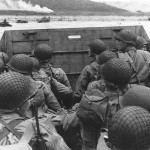Remembering D-Day
 There is some irony that the tally of those killed on D-Day -- 66 years ago Sunday -- roughly matches the death toll of 9/11, when the present “War on Terror” officially began.
There is some irony that the tally of those killed on D-Day -- 66 years ago Sunday -- roughly matches the death toll of 9/11, when the present “War on Terror” officially began.
There is some irony that those killed on D-Day -- 66 years ago Sunday -- roughly matches the death toll of 9/11, when the present “War on Terror” officially began: roughly 3,000 killed.
It’s fair to say that D-Day – June 6, 1944 – signaled the beginning of the end of WWII. Once American, British and Canadian beachheads were secured, it was only a matter of time and severe fighting before Germany was beaten, coupled with the advances of the Red Army on the Eastern front.
Today’s war on terror, declared by George W. Bush when he was president, is approaching it’s ninth year – three years longer than WWII lasted.
And WWII began 20 years after WWI ended – widely acclaimed (and believed) as the “war to end wars.” No such fantasy emerged after WWII, when many believed a war against Stalin’s Soviet Union was inevitable.
Blunt-speaking U.S. General George Patton, destined to die in a traffic accident, advocated going to war with the USSR sooner rather than later, since the U.S. already had its troops in Europe.
Saner leaders, like Churchill, urged that the West should not let down its guard against Soviet territorial and ideological ambitions. Canada’s somewhat weird prime minister, Mackenzie King, confided to his diary that he didn’t believe Stalin was aware or would condone espionage in Canada at the time of the defection of Igor Gouzenko.
On this 56th anniversary of D-Day, the world is confronted with a number of potential wars – even excluding Afghanistan, which is a war unlike any Canada has fought before.
Iran’s lust for nuclear weapons could lead to war, especially if Israel feels its survival is threatened. The recent Israeli commando drop on a Turkish ship that was part of an aid flotilla to Gaza, has the potential of escalating.
Probably the most serious confrontation looming involves the South Korean warship that sank last March, killing 46 sailors. An international investigation has determined the ship was torpedoed by a North Korean submarine.
In the past, such an act of aggression would warrant going to war. (Germany sinking the passenger ship Lusitania in 1915 hastened America’s entry into WWI).
Torpedoing another country’s warship in times of peace cannot be viewed as accidental or a mere mistake. If a mistake, where is an apology from North Korea? Where, indeed, is any evidence of regret on the part of Pyongyang?
Can anyone believe Pyongyang’s protestations of innocence?
Instead, Kim Jong Il has declared he and his indoctrinated regime no longer feel obliged to honor the 1953 armistice that ended the Korean war. So how likely is it that hostilities will break out between South and North Korea? Not very.
Kim Jong Il may be crazy but he’s not stupid. South Korea is not the hapless, deprived and threadbare country it was in 1950 when Kim’s dad, Kim Il Sung, encouraged by Stalin, sought to unite the peninsula under communism.
He nearly succeeded, but America rallied and the UN found some courage and three years later a truce was signed. Ever since, South Korea has progressed as a functioning democracy and economic power with a substantial military. South Korea’s President Lee Myung-bak has ordered a blockade of North Korean ships and calls North Korea, “the most belligerent regime in the world.”
North Korea is without real friends. China is embarrassed, Russia wants no part of it. North Korea’s testing of rockets, missiles and nuclear weapons is blackmail. The greatest gift Kim Jong Il could give the world would be to die and enable a regime change.
Meanwhile, we celebrate the anniversary of D-Day when Canada’s 3rd Infantry Division landed on Juno Beach, at the cost of some 1,200 Canadian casualties.